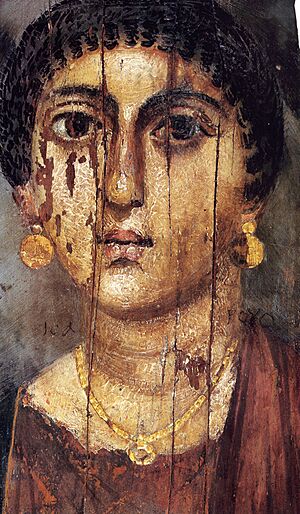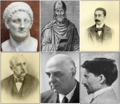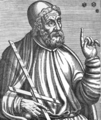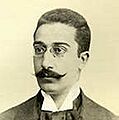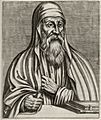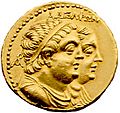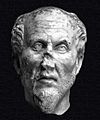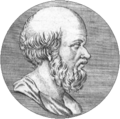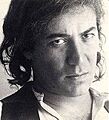Egyptian Greeks facts for kids
| Έλληνες της Αιγύπτου | |
|---|---|
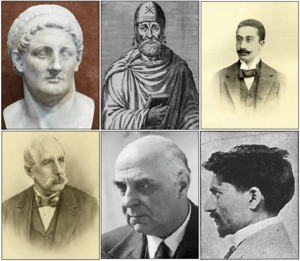 |
|
| Total population | |
| 200,000 (1920) 300,000+ (c. 1940) estimates vary between 5,000–60,000 (today) | |
| Regions with significant populations | |
| Alexandria, Cairo | |
| Languages | |
| Greek · Egyptian Arabic · French · English | |
| Religion | |
| Christianity: Coptic · Greek | |
| Related ethnic groups | |
| African Greeks · Ethiopian Greeks, Sudanese Greeks, Roman Africans |
The Egyptian Greeks, also known as Egyptiotes, are people of Greek background who have lived in Egypt. This community has been present in Egypt for a very long time, starting from the Hellenistic period (around 323 BC). However, after the Egyptian revolution of 1952, many of them had to leave the country.
Ancient Greek Presence in Egypt
Greeks have been in Egypt for thousands of years. We know this from ancient writers like Herodotus, who visited Egypt in the 5th century BC. He said that Greeks were among the first foreigners to live there. Another writer, Diodorus Siculus, even wrote about Greek cities being built in Egypt long ago.
First Greek Settlements
Around the 7th century BC, after a period called the Greek Dark Ages, a very important Greek city named Naucratis was founded in Egypt. It was located on the Nile River, not far from the sea. This was the first and for a long time, the only permanent Greek settlement in Egypt. It became a key place where Greek and Egyptian art and culture mixed.
Another important port for Greek trade was the city of Heracleion. It had a famous temple dedicated to the hero Heracles. This city later sank into the sea and was only found again recently.
Greek soldiers, known as mercenaries, also played a big role in Egyptian wars from the time of King Psammetichus I (664–610 BC) onwards.
Hellenistic Era: Greek Rulers in Egypt
This period began when Alexander the Great conquered Egypt.
Alexander the Great's Rule (332–323 BC)
Alexander the Great took control of Egypt early in his conquests. He respected the local Egyptian religions and customs. He was even declared the Pharaoh of Egypt. He also founded the famous city of Alexandria.
After Alexander died in 323 BC, his huge empire was divided among his generals. Egypt was given to one of his generals, Ptolemy I Soter. Ptolemy's family would rule Egypt for nearly 300 years. This family was entirely Greek. Famous rulers from this family include the well-known Cleopatra. Alexandria became their capital city.
The Ptolemaic Kingdom (323–30 BC)
Ptolemy's main goal was to make his new kingdom strong and secure. This led to many wars with other generals from Alexander's army. Eventually, he gained firm control of Egypt. He declared himself king of Egypt in 306 BC.
The Ptolemaic rulers respected Egypt's ancient traditions, especially its religion. They used these traditions to strengthen their own power.
Alexandria became a major center for Greek and Hellenistic culture. It was also a hub for trade, art, and science. The Lighthouse of Alexandria was one of the Seven Wonders of the Ancient World. The Library of Alexandria was the largest library in the world for a long time. The last Greek pharaoh was Cleopatra VII. She ended her life in 30 BC, after the battle of Actium.
Egypt Under Roman and Byzantine Rule
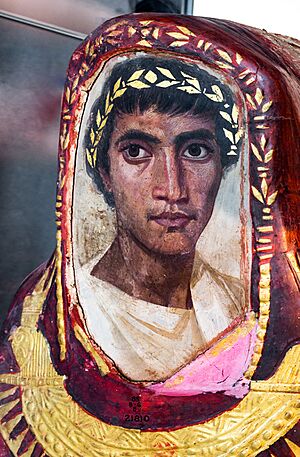
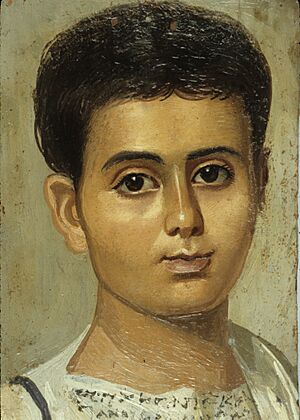
When the Romans took over Egypt, many Greek communities continued to live there. Most of them were in Alexandria, but also in other cities. Greek settlers lived alongside millions of native Egyptians. In a place called Faiyum, the first Greek residents were soldiers and officials. They were settled there by the Ptolemaic kings on new farmlands. Egyptians from other parts of the country also moved to Faiyum to work on these lands.
Coptic Greeks
It's thought that about 30 percent of the people in Faiyum during the Ptolemaic period were Greek. The rest were native Egyptians. The famous Faiyum mummy portraits show how Greek and Egyptian cultures blended together.
By the Roman period, many "Greek" people in Faiyum were actually Egyptians who had adopted Greek culture, or they were of mixed Egyptian-Greek background. By the 2nd century AD, Romans could tell the difference between ethnic Egyptians and Egyptian Greeks by how they spoke.
Egyptian Greek was the type of Greek spoken in Egypt from ancient times until the Arab conquest in the 7th century. This language borrowed many words from Coptic Egyptian. Many people in Egypt spoke both languages.
Here is an example of Egyptian Greek used in the Coptic Church:
ⲇⲟⲝⲁ ⲡⲁⲧⲣⲓ ⲕⲉ ⲩⲓⲱ: ⲕⲉ ⲁ̀ⲅⲓⲱ ⲡⲛⲉⲩⲙⲁⲧⲓ: ⲕⲉ ⲛⲩⲛ ⲕⲉ ⲁ̀ⲓ̀ ⲕⲉ ⲓⲥ ⲧⲟⲩⲥ ⲉⲱⲛⲁⲥ ⲧⲱⲛ ⲉ̀ⲱ̀ⲛⲱⲛ ⲁ̀ⲙⲏⲛ
Δόξα Πατρὶ κὲ Υἱῷ κὲ Ἁγίῳ Πνεύματι, κὲ νῦν κὲ ἀῒ κὲ ἰς τοὺς ἐῶνας τῶν ἐώνων. Ἀμήν.
Glory to the Father, to the Son, and to the Holy Spirit, both now and always, and unto the ages of ages. Amen.
Some historians believe that early Greek settlers married local women and adopted Egyptian religious beliefs. By Roman times, their descendants were seen as Egyptians by the Roman rulers, even if they still felt Greek themselves. Studies of ancient mummies from Faiyum also show that their physical features were more like ancient Egyptians than Greeks. This suggests that many marriages happened between Greek and Egyptian communities.
Medieval Islamic and Ottoman Eras
Greek culture and influence continued even during the time of the Ottoman Empire. Many Ottoman leaders, including sultans and pashas, had Greek roots. They ruled over the Ottoman Empire, which included Egypt. For example, Raghib Pasha, born in Greece, became Prime Minister of Egypt.
Many Greek Muslims from Crete were moved to Egypt and other places after a war in 1897.
Modern Times: The Greek Community in Egypt
In the early 20th century, the Greek community in Egypt was quite large. In 1920, there were about 200,000 Greeks, and by 1940, this number grew to around 300,000.
In Alexandria, the Greek community was centered around a church and a convent. There was also a guest house for Greek travelers, a Greek hospital, and a Greek school. The main Greek Orthodox bishop was based in Damietta.
In Cairo, the first organized Greek community started in 1856. They had their own neighborhoods and a main church. The Saint George monastery in Old Cairo still exists today. It has a large wall and a stone tower. Inside, there was a Greek hospital, a school, and housing for the elderly and poor.
Besides Alexandria and Cairo, there were Greek communities in other Egyptian cities like Mansoura, Port Said, Tanta, and Zagazig. Even in Upper Egypt, the oldest Greek community was in Minia, founded in 1812.
Greeks were important in Egypt's economy. They started some of the first banks, like the Bank of Alexandria. Greek farmers were also the first to grow cotton and tobacco using modern methods. They greatly improved the quality and amount of these crops, leading to a lot of exports. Families like the Salvagos and Benakis were famous in the tobacco business.
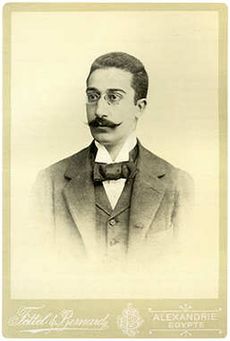
Greeks also contributed to other industries like food, wine, soap, and printing. Well-known food companies included macaroni makers like Melachrinos and Antoniadis. There were also many Greek theaters and cinemas. Important Greek newspapers included Ta grammata and Tahidromos. The Greek community in Egypt produced many artists, writers, and politicians. The most famous was the poet Constantine P. Cavafy.
During the Balkan Wars, Greek communities in Egypt sent volunteers and money to help. In World War II, over 7,000 Greeks from Egypt fought for the Allies.
The Greek Orthodox Church in Egypt
The Greek Orthodox Church of Alexandria is one of the oldest Christian churches in the world. It has been a central part of the Greek community in Egypt for centuries.
Generous Helpers (Benefactors)
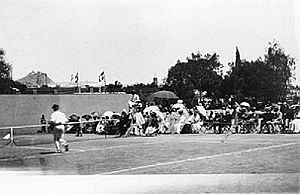
Many wealthy Greek industrialists, traders, and bankers from Egypt became philanthropists. This means they donated large amounts of money to help others. They built schools, hospitals, and other important buildings in both Egypt and Greece.
For example, Michail Tositsas gave money to build the National and Kapodistrian University of Athens. His wife, Eleni Tositsa, donated the land for the National Archaeological Museum of Athens. George Averoff helped build the National Technical University of Athens and donated a famous warship, the Averoff, to the Greek Navy. Emmanouil Benakis helped build the National Gallery (Athens), and his son Antonis Benakis founded the Benaki Museum. These people left a lasting legacy of generosity.
Greeks Leaving Egypt
Many Greeks started leaving Egypt even before the Egyptian Revolution of 1952. After the new government came to power under Gamal Abdel Nasser, and many industries were taken over by the state in the 1960s, thousands of Greek workers decided to move away. Many went to countries like Australia, the United States, Canada, South Africa, and Greece.
Because of this, many Greek schools, churches, and organizations closed down. However, some still operate today. The wars between Arab countries and Israel in 1956 and 1967 also caused many Greeks to leave cities along the Suez Canal.
The Greek Community Today
Today, the official number of Greeks in Egypt is about 5,000 people. However, some estimates suggest the number could be higher, up to 60,000, because many people of Greek origin are now counted as Egyptian citizens.
In Alexandria, the main Greek Orthodox church and a theology school have been reopened. Several Greek buildings in Cairo and Alexandria have been renovated with help from the Greek government. The Egyptian government has also shown new interest in working closely with Greece. This has helped the Greek community there. Economic ties between Greece and Egypt have grown, with Greek companies investing in banking, tourism, and other areas in Egypt.
Greek Population in Egypt (1907–1967)
Here's how the number of Greeks in Egypt changed over time:
| Egypt | 1907 | 1927 | 1937 | 1947 | 1960 | 1967 |
|---|---|---|---|---|---|---|
| Greeks | 62,973 | 76,264 | 68,559 | 57,427 | 47,673 | 17,000 |
Notable Greeks from Egypt
Many famous people have come from the Greek community in Egypt. Here are a few examples:
- Cleopatra VII (69 - 30 B.C.E., Alexandria) – The last pharaoh of Egypt.
- Euclid (325 - 265 B.C.E., Alexandria) – A very famous mathematician.
- Hypatia (370 - 416 C.E., Alexandria) – A brilliant female mathematician and philosopher.
- George Averoff (1815 - 1899, Alexandria) – A successful businessman and generous helper.
- Constantine Cavafy (1863 - 1933, Alexandria) – A highly respected poet.
- Penelope Delta (1874 - 1941, Alexandria) – A well-known author of children's books.
- Konstantinos Parthenis (1878 - 1967, Alexandria) – A famous painter.
- Dinos Iliopoulos (1915 - 2001, Alexandria) – A popular actor.
- Georges Moustaki (1934 - 2013, Alexandria) – A famous singer.
- Demis Roussos (1946 - 2015, Alexandria) – A globally recognized singer.
Images for kids
-
Hero of Alexandria, an ancient Greek engineer.
-
Philo, an ancient Greek philosopher.
-
Aristippus, an ancient Greek philosopher.
-
Ptolemy I Soter, the first Greek pharaoh of Egypt.
-
Ptolemy, an ancient Greek geographer.
-
A statue of Euclid, the famous mathematician.
-
Clement of Alexandria, an early Christian theologian.
-
A portrait of Constantine Cavafy.
-
Origen, an early Christian theologian.
-
A coin showing Ptolemy II Philadelphus, a Greek pharaoh.
-
Plotinus, an ancient Greek philosopher.
-
Diophantus, an ancient Greek mathematician.
-
Penelope Delta, a Greek author.
-
Ctesibius, an ancient Greek engineer.
-
Catherine of Alexandria, a Christian saint.
-
Konstantinos Parthenis, a Greek painter.
-
Konstantinos Tsaldaris, a Greek politician.
-
Eratosthenes, an ancient Greek mathematician.
-
Hypatia, a Greek mathematician and philosopher.
-
Constantin Xenakis, an artist.
-
Georges Moustaki, a singer.
-
Demetrio Stratos, a singer.
-
Demis Roussos, a singer.
-
A bust of Cleopatra VII.
See also
 In Spanish: Griegos de Egipto para niños
In Spanish: Griegos de Egipto para niños
- Demographics of Egypt
- Egyptian-Greek relations
- Kyriazi freres


